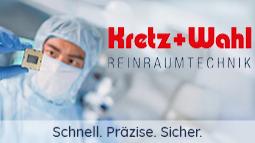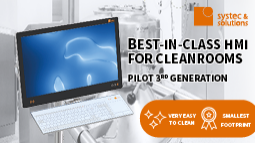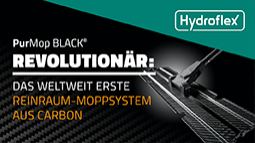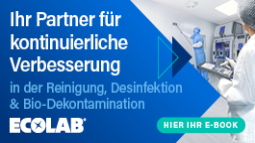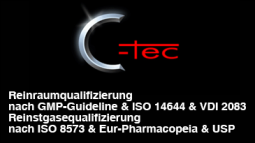- Bekleidung & Verbrauchsmaterial
New parenteral drug manufacturing laws put focus on cleanroom compliance
New laws aimed at raising the standard required for the manufacturing of parenteral drugs in German pharmacies put the emphasis on cleanroom compliance.
By June 1st, following a transition period of two years, all hospital and independent pharmacies will be required to comply with these new laws as detailed in ApBetrO.
At the heart of the new law is the need for parenteral medications to be manufactured in separated rooms and for all appropriate cleanroom conditions to have been maintained. If there is no sterilization after filling, pharmacies will need a Grade A area in a Grade B or C environment. Isolators can be placed in D rooms.
There will also be a requirement for a hatch between the Grade A area and cleanroom environment to provide a means of passing products safely in and out, minimising the risk of contamination.
Meanwhile, the new laws state that as part of the quality management system, the head of the pharmacy has to ensure self auditing is carried out on a regular basis. It is further recommended that external auditing also takes place.
One company leading the way in the control of microbial contamination in the pharmacy cleanroom environment is Ecolab Contamination Control. The firm produces a fully validated range of sterile products which is produced to the requirements of cGMP and supplied to pharmaceutical, healthcare, biotechnology, and medical device industries worldwide.
Dr Manfred Koranda of Ecolab Contamination Control said: ‘We provide contamination control solutions to the pharmaceutical industry and have followed guidelines which are at least as stringent, for more than 10 years. ‘With our products, experience and the correct cleaning regime, full compliance with the new legislation should be achievable.’ Products include sterile packed syringes, an extensive range of sterile pre-impregnated and sterile dry wipes and a fully validated range of sterile low residue biocides.
The dispensing system for disinfectants incorporates the patented SteriShield Delivery System which creates a fully closed validated system, preventing ‘suck back’. This ensures the integrity of the product is completely protected throughout its entire use and not simply at manufacturing stage.
Dr Koranda said: ‘ Research has proved that conventional trigger spays used with cleanroom disinfectants ‘suck back’ air meaning the contents of the bottle can be contaminated from the first moment of use, leading to a spread of contamination around the cleanroom. This actually happened in a hospital only eight hours after first use of 70% alcohol: Bacillus subtilis spores were found and survived inside the bottle.
‘Our fully validated protected closed trigger spray operates as a closed system due to the vacuum created in use, with the dip tube providing the only point of exit from the bag of sterile liquid, which protects the sterility of the contents indefinitely, with a recommended best practice in-use shelf life of three months.’
All Ecolab Contamination Control products are manufactured in purpose built state-of-the art cleanrooms to the requirements of cGMP, and meet the highest of industry standards.
In light of the new laws, Ecolab Contamination Control is offering its expertise to pharmacy operators.
Dr Koranda said: ‘This will be a difficult transition for most German pharmacies who will view the new laws as an added burden to an already busy workload.
‘At Ecolab Contamination Control we are ideally placed to offer expert advice to busy pharmacies, making this transition and future compliance with the new laws as easy as possible, helping them to deliver contamination control, without compromise.’
![]()
ECOLAB LIFE SCIENCES
Winnington Avenue
CW8 4DX Northwich, Cheshire
Vereinigtes Königreich
Telefon: +44 1606 721999
eMail: infoLS@ecolab.com
Internet: https://www.ecolablifesciences.com
